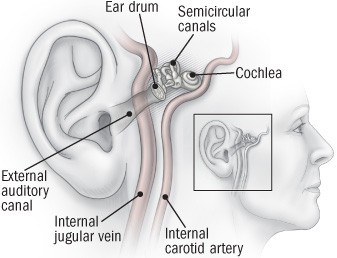Feeling your heartbeat in your ear, also known as pulsatile tinnitus, can be unsettling, and understanding the underlying causes is crucial. At WHY.EDU.VN, we aim to provide clear explanations and potential solutions to alleviate your concerns, differentiating between benign occurrences and symptoms that warrant medical attention, including subjective tinnitus and objective tinnitus. This article explores various reasons for this phenomenon and guides you on when to seek expert advice.
1. Understanding Pulsatile Tinnitus
Pulsatile tinnitus is the perception of a rhythmic pulsing, throbbing, or whooshing sound in one or both ears, often synchronized with your heartbeat. It’s different from regular tinnitus, which usually presents as a ringing, buzzing, or hissing noise. Recognizing the difference is the first step in understanding why you might be experiencing this unique auditory sensation. Most people experience subjective pulsatile tinnitus, but the rare objective pulsatile tinnitus can be heard by another person.
2. Common Causes of Hearing Heartbeat in Ear
Several factors can contribute to the sensation of hearing your heartbeat in your ear. Here’s a breakdown of the most frequent culprits:
2.1. Conductive Hearing Loss
 Illustration of the anatomy of the ear
Illustration of the anatomy of the ear
Conductive hearing loss occurs when sound waves cannot efficiently travel through the outer or middle ear to the inner ear. This can be due to:
- Middle Ear Infections: Infections lead to inflammation and fluid buildup.
- Fluid Accumulation: Fluid in the middle ear obstructs sound transmission.
- Ossicle Issues: Problems with the small bones (ossicles) in the middle ear disrupt the hearing process.
This type of hearing impairment amplifies internal sounds, making you more aware of your breathing, chewing, and blood flow. The proximity of the carotid artery and jugular vein to the ear means that increased awareness can manifest as hearing your heartbeat.
2.2. Carotid Artery Disease
The carotid arteries are major blood vessels in the neck that supply blood to the brain. Carotid artery disease involves the buildup of plaque (atherosclerosis) within these arteries, leading to:
- Turbulent Blood Flow: Plaque narrows the arteries, causing blood to flow unevenly.
- Audible Pulsations: This turbulence generates a pulsating sound that can be heard in the ear.
2.3. High Blood Pressure (Hypertension)
Elevated blood pressure increases the force of blood flow through your arteries. This heightened pressure can lead to:
- Increased Turbulence: Higher pressure amplifies the turbulence in blood vessels, particularly the carotid artery.
- Enhanced Sound Perception: This turbulent flow becomes more noticeable, resulting in the perception of your heartbeat in your ear.
2.4. Blood Vessel Disorders
Various blood vessel abnormalities can also trigger pulsatile tinnitus:
- Aneurysms: A weakened and bulging section of a blood vessel.
- Arteriovenous Malformations (AVMs): Abnormal connections between arteries and veins.
- Twisted Arteries: Irregularly shaped arteries that disrupt blood flow.
- Glomus Tumors: Benign tumors near the eardrum that affect blood flow.
These conditions alter blood flow dynamics, creating sounds that are transmitted to the ear.
2.5. Other Potential Causes
While less common, other factors might contribute to experiencing your heartbeat in your ear:
- Idiopathic Intracranial Hypertension (IIH): Increased pressure inside the skull.
- Paget’s Disease: A bone disorder that can affect the skull and auditory system.
- Thyroid Conditions: Thyroid disorders can sometimes influence blood flow and pressure.
- Anemia: Severe anemia can cause increased awareness of bodily sounds.
- Stress and Anxiety: Psychological stress can temporarily elevate blood pressure and awareness of bodily functions.
3. Identifying the Sounds: What Does It Sound Like?
Descriptions of the sound vary, but common ones include:
- Pulsing: A rhythmic beat synchronized with your heart.
- Thumping: A distinct, repetitive thudding sound.
- Whooshing: A rushing or swirling noise like wind.
- Throbbing: A pulsating sensation that may feel like a vibration.
4. When to Seek Medical Attention
While pulsatile tinnitus is often benign, it’s crucial to know when to consult a healthcare professional. Seek medical advice if:
- Persistence: The sound doesn’t disappear after a few weeks.
- Bothersome: The noise significantly impacts your daily life, causing distress or disrupting sleep.
- Accompanying Symptoms: You experience dizziness, hearing loss, headache, or vision changes.
- Neurological Concerns: Any neurological symptoms like weakness, numbness, or speech difficulties are present.
- Known Cardiovascular Issues: If you have pre-existing heart conditions or risk factors for heart disease.
A healthcare provider can conduct a thorough evaluation to identify the underlying cause and recommend appropriate treatment.
5. Diagnostic Tests and Procedures
To determine the cause of pulsatile tinnitus, your doctor may recommend the following tests:
5.1. Physical Examination
A comprehensive physical examination will include:
- Medical History: Discussion of your symptoms, medical history, and medications.
- Ear Examination: Using an otoscope to visualize the ear canal and eardrum.
- Auscultation: Listening to the blood flow in your neck using a stethoscope to detect bruits (unusual sounds).
5.2. Hearing Test (Audiometry)
An audiometry test assesses your hearing sensitivity and identifies any hearing loss, which can contribute to pulsatile tinnitus.
5.3. Imaging Studies
Imaging tests provide detailed views of your blood vessels and other structures:
- MRI (Magnetic Resonance Imaging): To visualize soft tissues and blood vessels in the head and neck.
- CT Scan (Computed Tomography): To examine bone structures and detect abnormalities.
- Ultrasound: To assess blood flow in the carotid arteries.
- Angiography: X-ray imaging of blood vessels using contrast dye to identify blockages or abnormalities.
5.4. Blood Tests
Blood tests can help rule out other potential causes, such as:
- Complete Blood Count (CBC): To check for anemia or infection.
- Thyroid Function Tests: To assess thyroid hormone levels.
- Blood Pressure Measurement: To evaluate for hypertension.
6. Treatment Options for Pulsatile Tinnitus
Treatment strategies vary depending on the underlying cause of the pulsatile tinnitus:
6.1. Managing Underlying Medical Conditions
Addressing the root cause is often the most effective approach:
- High Blood Pressure: Medications and lifestyle changes to lower blood pressure.
- Carotid Artery Disease: Medications to manage cholesterol and prevent blood clots; in severe cases, surgery (carotid endarterectomy) or angioplasty may be necessary.
- Infections: Antibiotics or other appropriate medications to treat infections.
- Blood Vessel Disorders: Surgical intervention or other specialized treatments for aneurysms, AVMs, or glomus tumors.
6.2. Hearing Aids
If conductive hearing loss is a contributing factor, hearing aids can improve sound transmission and reduce the perception of internal noises.
6.3. Tinnitus Retraining Therapy (TRT)
TRT is a therapy designed to help you habituate to the sound of tinnitus, making it less bothersome over time.
6.4. Cognitive Behavioral Therapy (CBT)
CBT can help you manage the emotional distress and anxiety associated with pulsatile tinnitus.
6.5. Lifestyle Modifications
Certain lifestyle adjustments can help manage or alleviate pulsatile tinnitus:
- Reduce Salt Intake: Lowering sodium can help regulate blood pressure.
- Limit Caffeine and Alcohol: These substances can affect blood flow and pressure.
- Manage Stress: Practice relaxation techniques such as meditation, yoga, or deep breathing exercises.
- Stay Hydrated: Adequate hydration supports healthy blood volume and circulation.
- Regular Exercise: Promotes cardiovascular health and helps regulate blood pressure.
7. Expert Insights on Pulsatile Tinnitus
According to Dr. David M. Vernick, MD, “A patient’s story often holds important clues” in diagnosing pulsatile tinnitus. A thorough medical history and physical examination are essential first steps. If no obvious cause is found, additional testing, including a hearing test and imaging studies, may be recommended.
Dr. Howard E. LeWine, MD, emphasizes that “Most of the time, pulsatile tinnitus is nothing to worry about.” However, he advises seeking medical attention if it persists, becomes bothersome, or is accompanied by other symptoms.
8. Living with Pulsatile Tinnitus
Here are practical tips for coping with pulsatile tinnitus in your daily life:
- Sound Masking: Use white noise machines, fans, or nature sounds to mask the tinnitus.
- Relaxation Techniques: Practice mindfulness, meditation, or deep breathing exercises to reduce stress and anxiety.
- Support Groups: Join a support group to connect with others who experience tinnitus and share coping strategies.
- Hearing Protection: Protect your ears from loud noises to prevent further hearing damage.
- Healthy Lifestyle: Maintain a balanced diet, exercise regularly, and get enough sleep.
9. Frequently Asked Questions (FAQs)
9.1. Is pulsatile tinnitus always serious?
No, in many cases, pulsatile tinnitus is benign and caused by temporary factors like stress or minor blood flow changes. However, it’s essential to consult a doctor to rule out underlying medical conditions.
9.2. Can stress cause pulsatile tinnitus?
Yes, stress can elevate blood pressure and increase awareness of bodily functions, potentially triggering or worsening pulsatile tinnitus.
9.3. Will pulsatile tinnitus go away on its own?
In some cases, pulsatile tinnitus may resolve on its own, especially if it’s related to temporary factors. However, persistent or bothersome symptoms warrant medical evaluation.
9.4. What kind of doctor should I see for pulsatile tinnitus?
Start with your primary care physician, who can refer you to an otolaryngologist (ENT doctor) or audiologist for further evaluation.
9.5. Can pulsatile tinnitus affect my sleep?
Yes, the constant noise can be disruptive and interfere with sleep. Using sound masking techniques and practicing relaxation exercises can help improve sleep quality.
9.6. Are there any medications that can cause pulsatile tinnitus?
Some medications, such as certain antibiotics, anti-inflammatory drugs, and antidepressants, can cause or worsen tinnitus as a side effect. Discuss your medications with your doctor.
9.7. Can changes in posture or head position affect pulsatile tinnitus?
Yes, certain positions can alter blood flow and pressure, potentially affecting the intensity of pulsatile tinnitus.
9.8. Is there a cure for pulsatile tinnitus?
There is no one-size-fits-all cure for pulsatile tinnitus. Treatment focuses on managing the underlying cause and alleviating symptoms.
9.9. Can pulsatile tinnitus lead to hearing loss?
Pulsatile tinnitus itself does not directly cause hearing loss. However, underlying conditions that contribute to pulsatile tinnitus, such as conductive hearing loss, can affect hearing.
9.10. How can I distinguish pulsatile tinnitus from regular tinnitus?
Pulsatile tinnitus is characterized by a rhythmic pulsing or whooshing sound that is synchronized with your heartbeat, while regular tinnitus typically presents as a ringing, buzzing, or hissing noise.
10. The Role of WHY.EDU.VN in Answering Your Health Questions
At WHY.EDU.VN, we understand the anxiety and uncertainty that health concerns can bring. Our platform is dedicated to providing reliable, accessible, and expert-backed information to empower you to make informed decisions about your health.
- Comprehensive Information: We offer detailed explanations of various medical conditions, symptoms, and treatments.
- Expert Insights: Our content is reviewed by healthcare professionals to ensure accuracy and credibility.
- User-Friendly Interface: Our website is designed to be easy to navigate, making it simple to find the information you need.
- Community Support: Connect with other users to share experiences, ask questions, and find support.
11. Conclusion: Taking Control of Your Ear Health
Experiencing your heartbeat in your ear can be unsettling, but understanding the potential causes and available solutions can empower you to take control of your ear health. Whether it’s a temporary issue or a sign of an underlying condition, seeking timely medical advice and adopting healthy lifestyle habits can make a significant difference. Remember, WHY.EDU.VN is here to provide you with the knowledge and resources you need to navigate your health journey with confidence.
Are you still curious or concerned about the sounds you’re hearing? Don’t hesitate to reach out to the experts. At WHY.EDU.VN, we connect you with professionals who can provide personalized answers and guidance. Visit us at 101 Curiosity Lane, Answer Town, CA 90210, United States, contact us via Whatsapp at +1 (213) 555-0101, or explore our website at why.edu.vn for more information and support. Your peace of mind is just a question away.

